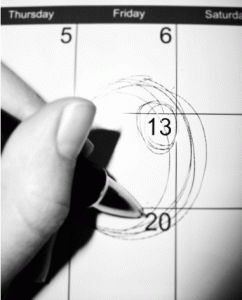(But really, they’re not hurting anyone, so don’t knock it.)
By Sarah Craig
There are many common superstitions that have forced themselves into our culture, and that means one thing for unsuspecting victims: bad luck. According to a study by two Rutgers University professors, Robert Schindler and Grant Adams, 44 percent of Americans admit to having at least one superstition. But when it comes to superstitions, most will agree they are simply not real. Still, what matters is that in the believer’s mind, the superstition becomes reality.
Superstitions are often the product of an accident that causes confusion. “People do not like uncertainty. When something happens, good or bad, your brain is struggling to understand it,” explains Jeff Holmes, a psychology professor at Ithaca College. The brain often comes up with an illogical answer for an incomprehensible event, which becomes that person’s superstition. The next time they are in a similar situation, the individual will remember and follow their superstition with the hope of eliciting, or avoiding, the outcome.
Besides commonly-known superstitions that have survived for years, there are many that are passed on through a family or created by individuals. IC junior Chris Konnaris admits she can’t cross the street without looking behind her. When she was young, her mother told her a black dog would chase her if she didn’t run across crosswalks. If she got to the other side before the crossing light stopped blinking, the black dog would get hit by moving cars, but if not, it would get her. “In retrospect I’m pretty sure she just didn’t want me getting hit by cars,” says Konnaris. Unintentionally, her mother instilled something that is still part of her life today.
There are also those superstitions that deal with a certain group of people. Both theater groups and sports teams have many superstitions pertaining to their performance. Wade Boggs, a famous baseball player, was known to have around six hours of rituals before each game to help his performance. Likewise, IC junior Jenna Grossman explains her numerous theater beliefs, such as don’t whistle backstage and never say good luck on opening night. She once even made someone do a counter-curse before a play started because they said “MacBeth,” which included turning around clockwise, swearing, slapping their chest and then spitting between their fingers. “You don’t want to mess with this one,” Grossman warns. “There have been productions where prop daggers were swapped for real ones and actors were accidentally murdered onstage.”
Many people, even if they don’t have a certain ritual they follow, have good luck charms. Holmes calls the process of developing superstitions non-contingent reinforcement. This means there is a connection between a good thing that happened and your “lucky” item. “The example that I always give my intro students is that you buy a new shirt, you’re walking to class and you find $50 on your way to class. So it’s your lucky shirt,” Holmes says. And though it was simply a coincidence the two events happened together, a person’s mind will say otherwise.
Generally, people will follow superstitions because they just don’t want to take risks. Logic may say one thing, but just a little doubt can create enough fear of bad luck to make people do some strange things. Yet the initial action is generally so small and effortless it doesn’t trouble an individual to carry it out, such as walking around ladders instead of under them. “There is no real downside of carrying out the action,” says Holmes. “But the perspective downside of not doing it is usually major. That’s what perpetuates superstitions most of the time. It’s just not worth testing. It’s a small investment for what you feel is a large return.”
Because of this major downside (usually a bad consequence), superstitions are often given negative connotations. Some can be beneficial “if you think instead, if I do this it’s in some way empowering me to have some advantage,” explains Holmes. A recent poll by Fox News found that the most common superstition and belief was the four-leaf clover, suggesting people would rather believe in good luck than bad. Since supersitions exist, they might as well provide more comfort than concern.
You might think avoiding cracks is pointless (and stomp on them just to prove it), but to someone else, it is a legitimate worry. Ultimately, it can give a person peace of mind and make them feel more secure by just following through. The worst that can happen is that a person can be distracted for a moment or be extra cautious. No harm, no foul. So there’s nothing wrong with being a little superstitious, but breaking that myth wouldn’t be the end of the world either. (Knock on wood.)
____________________________________
Sarah Craig is a junior journalism major, and she just walked under a ladder. Fuck. E-mail her at scraig1@ithaca.edu.

